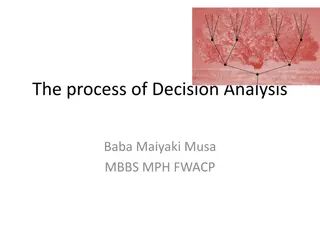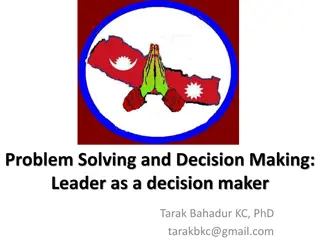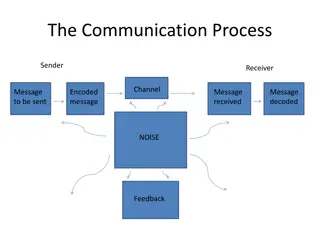Mastering Group Discussions for Effective Communication and Decision-Making
Explore the world of group discussions with this comprehensive guide. Learn about the importance of group discussions in problem-solving and decision-making. Understand the process involved in conducting successful group discussions, from seating arrangements to evaluation criteria. Gain insights into group discussion strategies, dos and don'ts, and FAQs. Enhance your communication skills, critical thinking abilities, and confidence through active participation in group discussions. Dive into the realm of verbal-oriented performances to assess leadership potential and candidate screening effectively.
Download Presentation

Please find below an Image/Link to download the presentation.
The content on the website is provided AS IS for your information and personal use only. It may not be sold, licensed, or shared on other websites without obtaining consent from the author. Download presentation by click this link. If you encounter any issues during the download, it is possible that the publisher has removed the file from their server.
E N D
Presentation Transcript
ManagementStudyGuide.com Learn Management the Easy Way with the Help of Downloadable Power- point Presentations - Learn at Your Own Pace. The Presentation contains Animation. To View the Course please run the Slide Show . You Can Run the Slide Show by Using any one of the following options: 1. Click on the Slide Show in top menu bar, OR 2. Press the F5 Key Register Now& Download Your Set of6 Free Power-point Presentations with total of more than 1,000 Slides.
Course Objectives 1 What is a Group Discussion 2 Importance of Group Discussion 3 Types of Group Discussion 4 Process of Group Discussion 5 Evaluation Criteria of Group Discussion Preparing for Group Discussion 6 7 Do s & Don ts of Group Discussion 8 FAQs on Group Discussion
What is Group Discussion? It is essentially a verbal - oriented performance where participants have to talk their way out It is also called leaderless discussion as it aims to find out the natural leadership level of candidates It is a technique or a method used for screening candidates as well as testing their potential What is Group Discussion? It is used as a tool to assess candidates in a group at one go in order to select the best in comparative perspective
Importance of Group Discussion More often than not, it helps the group reach a decision and solve a particular problem It helps understand a subject more deeply and improves ability to think critically It improves listening skills and also gives a chance to listen other participants view points It helps participants gain confidence by being vocal about their thoughts / opinions
Process of Group Discussion 1 2 3 4 5 Candidates may be seated in a circle or in a rectangular arrangement, with/out a table. Seating arrangements may be prefixed For a topic-based GD, 2-3 minutes of thinking time may be given; though the group is often told to start right away. For case studies, however, about 15 minutes is given Evaluation is done by experts, usually professors from B-School. These people are experts and observe all details, even if the GD is chaotic Discussion may be stopped at the set time / even earlier. Conclusion may be asked for. A written / oral summary may be asked for at the end from each candidate 8-10 students are taken as a group, though in some cases, up to 16 people may be included in a group. The GD lasts for 10-15 minutes
Evaluation Criteria for Group Discussion It includes smartness, cheerfulness, enthusiasm, attitude, and confidence Communication It includes interpersonal skills, body language, aggressive / assertive communication Skills Personality Creativity It includes thinking out of the box Knowledge It includes subject matter, relevance, and depth Persuasion It includes ability to convince other participants without being aggressive Skills Analytical Skills Leadership It includes thinking logically and rationally It includes giving direction to the group in terms of content
Preparing For Group Discussion 1. Content Develop subject knowledge on current affairs, general awareness & business trends. Structure arguments [for & against] on selected topics, considering both sides to the argument. Plan for short and crisp points. 3 2 1
Dos & Donts of Group Discussion Listen to the given topic carefully. Structure your points on the sheet provided Be assertive not dominating; try to maintain a balanced tone in your discussion and analysis Be prepared with some of the topics. Keep yourself updated on current affairs. Try to remember the names of the participants in the GD, when you are targeting individuals address them with the names Summarize the discussion if the group has not reached a conclusion
FAQs on Group Discussion Is there time given for preparation after the topic is given and before starting the GD? Usually some time (2-5 minutes) is given to collect one's thoughts, but there could be instances when this does not happen, so it is best not to bank on this. Should I address the panel or the group members? Don't ever make the mistake of addressing the panel members while the GD is on. The GD is between you and the other members, not the panel members. You must avoid even looking at the panel members while the GD is in progress. Just ignore their existence. What is the seating arrangement like? It could be semi-circular, or circular, or seating alongside a rectangular table, depending upon the venue. It is best not to bother about trivial issues like this, which you have no control over.
ManagementStudyGuide.com Learn Management the Easy Way with the Help of Downloadable Power- point Presentations - Learn at Your Own Pace. This is a DEMO Course On Group Discussion Strategies. The Complete Course Consists of 50 Slides. Click here to Register Now& Download Complete Presentation on Group Discussion Strategies and 5 More Topics with more than 1,000 Slides Absolutely FREE. 75 Courses Added So far with more than 15,000 Slides+ New Courses Added Every Week. Click here to Go to All Courses






















































